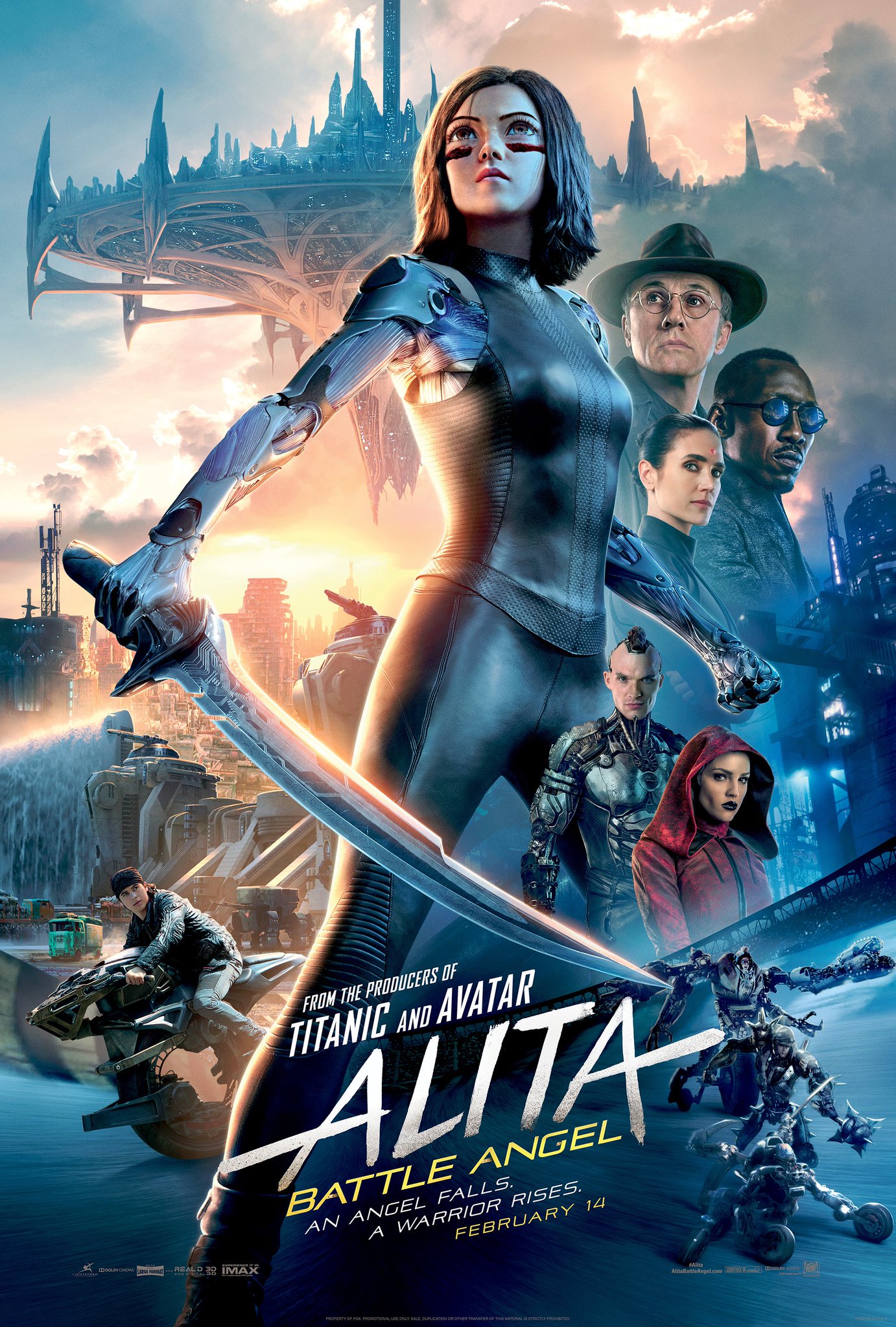
I hope James Cameron thanked Robert Rodriguez and Rosa Salazar profusely for saving this.
Based on Yukito Kishiro’s cult classic 90s mannga “Gunnm,” localized internationally as “Battle Angel Alita,” “Alita: Battle Angel” has been a passion project for director James Cameron for nearly 2 decades.
Set in the 26th century following the collapse of
civilization as we once knew it as a result of interstellar warfare, the film
chronicles the life of Alita, a cyborg discovered by the enigmatic mechanic Dr.
Ida (Christoph Waltz) in the scrap yards of Iron City, a dumping ground for the
utopian sky city Zalem.
Alita is repaired and revived by Ida but has no recollection
of her life prior to waking up, forcing her to rebuild a new life from scratch
with Ida in his clinic for cyborgs. The further she becomes intertwined within
his affairs however, she begins to attract the attention of dangerous figures
from Zalem above ready to tear the city apart to retrieve her, forcing her to
confront her past to the chagrin of those that have grown to love her in the
new life she’s made for herself.
Famous as a cult classic that helped stimulate the growing
anime boom of the 90s, “Battle Angel Alita” is a very high concept work with
themes of transhumanism, redemption, love, and self identity centralized in a
character study of its titular character as she struggles to piece together her
own lost history.
Bringing such a project to the big screen with all of the
quirks of its cyberpunk identity in tact is a substantial undertaking that
James Cameron absolutely deserves credit for but the true heroes of “Alita:
Battle Angel” ultimately end up being Robert Rodriguez’s direction and Rosa
Salazar’s anchor of a portrayal as Alita herself.
Perhaps he may have benefited from adapting a work from the
very decade that saw him breakthrough as a filmmaker but whatever the reason
may be, Rodriguez’s old fashioned rebelliously over the top stylism manages to
bring the world of “Alita: Battle Angel” to life gloriously in an almost alien
B-movie vibe akin to a Paul Verhoeven movie minus the obviously ironic subtext,
embracing cheese in an almost science fiction fairytale capacity, rather than
bending over backward to justify it.
It doesn’t always feel like our world but like a living and
breathing world all the same, from the extras mingling in the background of
various cybernetic enhancement to the cheers of the crowd partaking in the
brutality of the fictional sport motorball.
The stakes of that world are all born from investment within
Alita’s trials and it’s here where the movie is firing on all cylinders.
Alita’s stylized CGI design, paying homage to the film’s
manga/anime origins, becomes a key device for identifying with her as she tries to
discover who she was while choosing who she wants to be and Rosa Salazar
manages to perfectly tow the line between being a hard capable fighter coming
off as a force of nature to be reckoned with and a confused vulnerable girl
trying to find her way in a world she doesn’t recognize, while having to
occasionally put up a somewhat immature adolescent-esque front of strength to
get out of certain binds.
Christoph Waltz’s fatherly relationship with her really
resonates and her budding romance with one of his young gofers Hugo is so
believably awkward and adorable I almost found myself blowing off my own
cringing at some of their occasionally questionable dialogue.
“Alita: Battle Angel” is steeped in heart, emotional impact,
visual creativity, and generally pitches a saga I would love to see more of,
which is why it’s almost a cosmic joke that after almost 20 years of
development, this screenplay is the final draft that James Cameron and producer
Jon Landau went with.
Similarly to “Aquaman” this is a movie saved in the
filmmaking stage of development, turning a clunky script into a solid,
charming, functional, throwback to cinematic genre faire of old. Unlike Warner
Bros. billion dollar grossing titan of a superhero movie though, this one doesn’t
quite make it out unscathed.
Moments of stiff dialogue aside, “Alita: Battle Angel” is
plagued with way too many plots attempting to adapt way too much material. The number
of meaningless antagonists, meandering threads to subplots, and details given
to narrative arcs that have no payoff pile up and bloat down a movie that I’m
almost tempted to say could still be saved with one more editing pass.
Many of the ideas in question, from the revelation of the
film’s actual antagonist employing Jennifer Connelly and Mahershala Ali, to the
fate of Alita and Hugo’s romance aren’t necessarily bad but feel rushed and
undercutting of more powerful moments presented earlier within the movie.
The end result makes a passion project involving artists
that were clearly in love with what they were working on feel cheapened by
ploys for sequels and spinoffs that don’t mesh well with a narrative that was
already fairly murky by design.
Cameron’s bizarrely scattershot screenplay seemingly more
obsessed with fandom over storytelling sadly holds “Alita: Battle Angel” back
from the greatness it was within a hair’s width of achieving. For all of its
hiccups however, the sincerity of the direction and performances is so
infectious I couldn’t tear myself away from the movie without rooting for it.
7 Motorball Runs out of 10
No comments:
Post a Comment